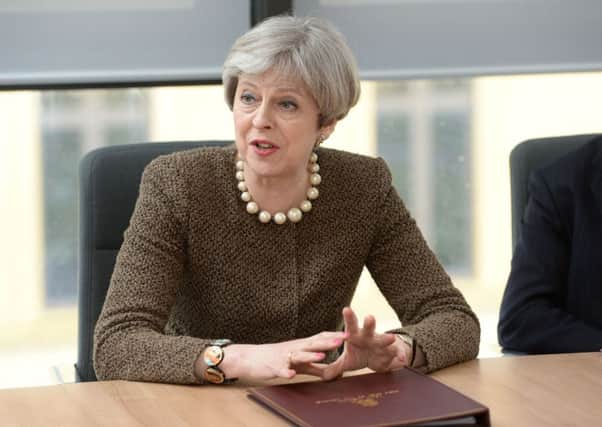PM: I will not change my mind on Scottish referendum


Speaking in Glasgow ahead of talks with First Minister Nicola Sturgeon, Theresa May argued it would be “unfair” to ask the Scottish people to make such a significant decision before the outcome of Brexit negotiations are clear, insisting “now is not the time” for the UK to pull apart.
Advertisement
Hide AdAdvertisement
Hide AdHer comments came as members of the Scottish Parliament prepared for a second day of debate on SNP plans for a second referendum, after last week’s session was postponed as a result of the attack in London.
The proposals are expected to get majority support from MSPs, paving the way for Ms Sturgeon to apply to Westminster for permission to hold a vote, which she believes should take place by spring 2019.
Mrs May’s visit to Scotland forms the latest stage of her tour of devolved nations – a gesture designed to prove that the Government is “engaging and listening to people from right across the nation” in the run up to Brexit talks.
Last week saw the Prime Minister visit Swansea in Wales, where she expressed her “determination to strengthen and sustain the precious Union” of the devolved nations.
Advertisement
Hide AdAdvertisement
Hide AdShe began her trip with a speech to Department for International Development staff in Kilbride, where she spoke of the need for Britain to come together and become “an unstoppable force” on the world stage after Brexit.
She also hinted at plans to hand over new powers to the devolved assemblies, promising to “fully respect... the devolution settlements”.
“A more united nation means working actively to bring people and communities together by promoting policies which support integration and social cohesion,” she said.
“In Scotland, Wales and Northern Ireland that means fully respecting, and indeed strengthening, the devolution settlements. But never allowing our Union to become looser and weaker, or our people to drift apart.
Advertisement
Hide AdAdvertisement
Hide Ad“[And] in those policy areas where the UK Government holds responsibility, I am determined that we will put the interests of the Union – both the parts and the whole – at the heart of our decision-making.”
The Prime Minister then travelled on to Glasgow before meeting with Ms Sturgeon. Commenting on the SNP leader’s calls for another referendum, she told reporters her view “is very simple and it hasn’t changed”.
“It is that now is not the time to be talking about a second independence referendum and that’s for a couple of reasons,” she said.
“First of all, now is the point when we are triggering Article 50, we’re starting negotiations for leaving the European Union. Now is the time when we should be pulling together, not hanging apart.
Advertisement
Hide AdAdvertisement
Hide Ad“Also I think it would be unfair on the people of Scotland to ask them to make a significant decision until all the facts were known, at a point where nobody knows what the situation is going to be.
“My position isn’t going to change, which is that now is not the time to be talking about a second independence referendum.”
Tomorrow’s vote in Holyrood is expected to see Green MSPs back the SNP in calling for a referendum, allowing Ms Sturgeon to make a formal request to Westminster under Section 30 of the 1998 Scotland Act.
Scottish ministers argue there has been no clarity over how Scotland’s interests will be represented as the Brexit process gets under way, while pointing out that the majority of the Scottish voters opted to remain in the EU.
Advertisement
Hide AdAdvertisement
Hide AdA spokeswoman for Scotland’s Brexit minister Michael Russell said: “Given the lack of engagement and the failure of the UK Government to seek an agreed approach or to support staying in the single market, which are at the heart of our compromise proposals, it is appearing that this is another area where a Tory Prime Minister intends to simply dictate the rules.
“We believe it should be for the people of Scotland to decide their own future.”